Leer en Español
The crowds were back at the Kingston Farmers Market. On a Saturday in May, the hustle and bustle extended to live music, the laughter of children as they chalk-painted and blew bubbles, and the usual community of home cooks who are on a mission to fill their bags with fresh and locally grown food for the forthcoming week. Among the selection of vegetables, dairy and bread are grains, corn, and beans grown here in the Hudson Valley.
Jenny Kubo gazed at the display of flour at the Hudson Valley Farm Hub booth and picked up a bag of whole wheat flour for bread and pancakes. A self-described home baker, Kubo says she’s keen on finding locally grown grains but it hasn’t been easy.
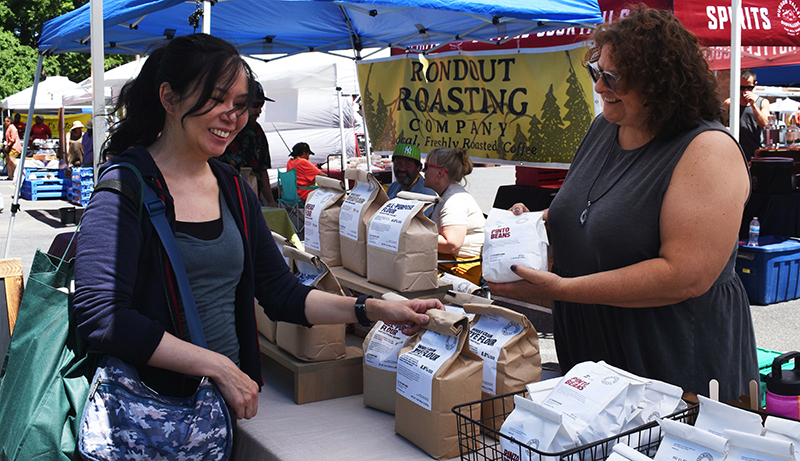
“I am interested in whole grains and seeing the more-healthy wheat that is grown organically from the origins,” she says, noting that it was the first time that she found locally grown wheat. “It is just hard to find any good flour and grains that are not the white processed stuff in the supermarket. I like to check out what kind of flour people are milling at different farms and see how it tastes.”

This past spring the Farm Hub introduced flour, corn meal, popcorn, beans, tortillas, and tortilla chips, made from organic ingredients grown at the farm. The products, developed under Milestone Mill a newly created brand, have been available at the Kingston Farmers Market and the Beacon Farmers Market. The products are processed and co-packed with partnerships in New York. The products have drawn interest from home bakers to professional bakers and restauranteurs. The flour is being used at Kingston Bread & Bar in Kingston and Kelly’s Bakery in Poughkeepsie.
Jennifer Muck-Dietrich, the Farm Hub’s market coordinator for the Kingston Farmers Market, says that there has been considerable interest in the products.
“People often say `I didn’t know we grew grains and beans in the Hudson Valley,’” Muck-Dietrich observes. “They are fascinated that we can grow locally grown wheat.” Popcorn, black beans, and corn meal are popular as is bread flour.
Journey from field
The seeds of Milestone Mill were planted in 2012 as part of a year-long research project on local food infrastructure in the Hudson Valley.
In the 2012 report “Reviving Grain in the Hudson Valley,” Sarah Brannen, the Farm Hub’s director of regional and community food initiatives, wrote, “Anecdotally, we heard that farmers were challenged in finding right-sized, local food processing facilities to craft value-added products.” The report identified key trends including the growth of local microbreweries and bakers coupled with a dearth of local grains. Barriers to growing grains included cost and access to equipment, and a lack of infrastructure, especially for the many small acreage farmers in the region. Farmers also said they were keen on better understanding what varieties of grains would thrive in the region. The report asked what are the lead barriers to increasing the production and purchasing of local grains and what resources would help alleviate those barriers.
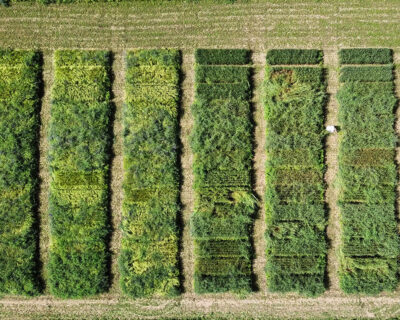
In 2013, the Farm Hub partnered with researchers at Cornell University and Cornell Cooperative Extension of Ulster County to gather data on a variety of grains with the goal of sharing these findings with regional farmers. The Small Grains Trials have studied over 100 varieties of wheat, barley, rye, oats, and ancient grains. With certain varieties marked as popular with local bakers, the Farm Hub’s Community Food Program led by Brannen, found co-packers, processors, and millers in the region with whom to partner. In 2020 and 2021, the Farm Hub partnered with Tortilla Nixtamal (since closed) to produce tortillas and tortilla chips for taste testing and with Wild Hive Farm in Dutchess County for the milling of various grains.
In 2021 the Farm Hub began offering the milled flour to local bakers and home bakers to give the flour a test run. Testers included popular bakeries such as Bread Alone and Kingston Bread + Bar. In parallel, The Farm Hub hosted field days and worked to bring the field crops to organic certification.
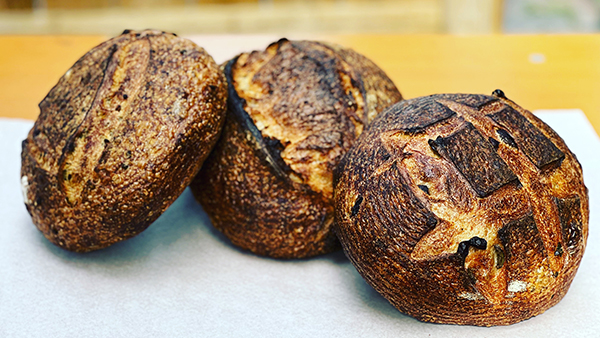
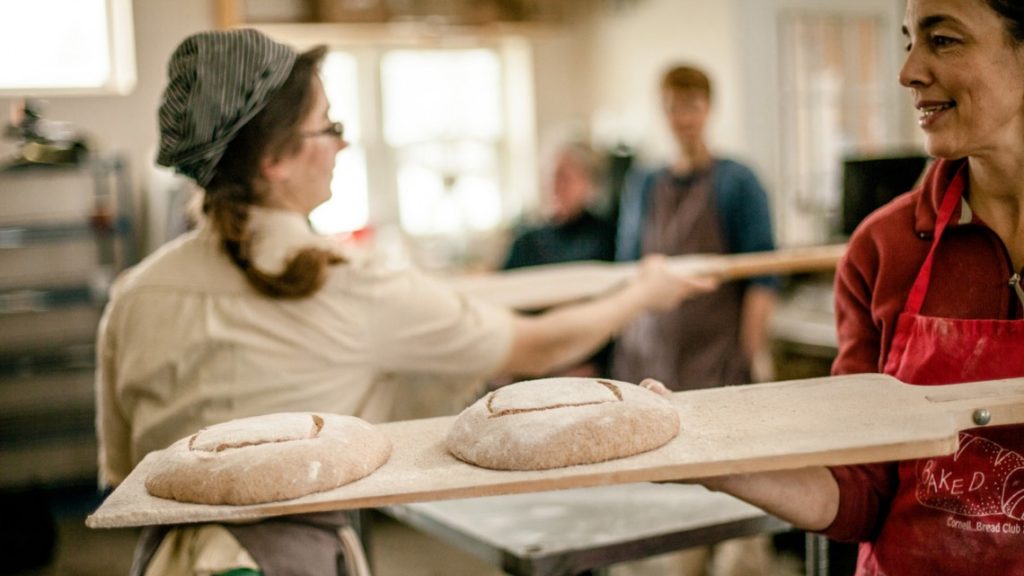
Turn the clock forward to today and the interest in developing a local grains economy by consumers, growers, and those in the regional food industry, has increased in part due to COVID-19. The pandemic sparked a home baking boom as shelves emptied due to supply-chain bottlenecks, and as a quarantine activity with sourdough leading the pack.
Grow local, buy local, and go green
Mark Sorrells, a professor of plant breeding at Cornell University who worked on the trials, has said in the film “Growing With the Grain (2019)” that the Hudson Valley stands out from many regions in New York because of its demand for hard wheat for baking bread, coupled with a burgeoning consumer market for local grains. Sorrells also emphasized the “grow local, buy local” trend in the region. The “Reviving Grain in the Hudson Valley” report asserted that the proximity between New York City and the Hudson Valley region also created a golden opportunity to combine a burgeoning small grains economy locally with a regional market.
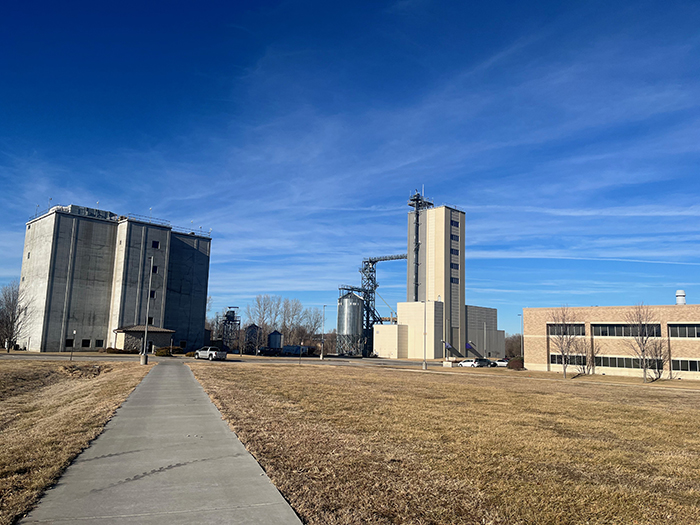

Brannen and the Community Food Team have been preparing for the launch of Milestone Mill. The team has grown to include a delivery driver and market coordinators to run the farmer’s markets. Next year, a practice mill will be installed at the Farm Hub, allowing for limited production while the permanent mill is in development. The team has been engrossed in educating themselves on grains, working closely with the Farm Hub field crops team, and gleaning knowledge from existing co-packers and processors.
In April, Brannen and Jay Krauer (Milestone Mill’s miller), attended “Introduction to Flour Milling,” a weeklong certificate program at Kansas State University. The course intensively reviewed the process of baking from field to oven. Many of the attendees are millers who work at national companies that produce grains on a global scale. Attendees were primarily those working in the consumer foods industry.
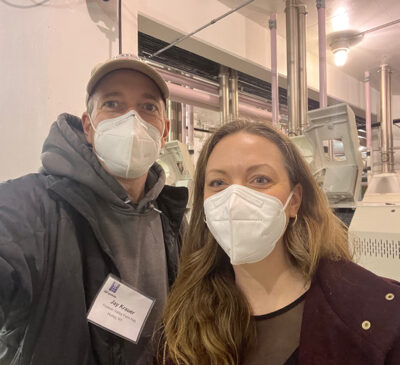
“What they’re doing in a week at some of these mills is what we’re planning on doing for like the year, and it was a great learning experience to see how they do it on a large scale,” says Krauer. Milestone Mill will produce flour, corn meal, beans, tortillas, and tortilla chips using stone milling.
“The stone milling creates a lot less heat and so there are more nutrients in the flours,” he says.
Training and learning are critical for Krauer and other members of the Milestone Mill team as they prepare for launch. The team meets with Christian Malsatzki the agricultural program leader at Cornell University who works with Cornell University and the Farm Hub on the small grains trial. They regularly walk the fields at the Farm Hub to immerse themselves in the details of grains. During a recent meeting, Malsatzki talked about the connection between heading dates (the time period from germination to panicle initiation and the reproductive phase) and harvest dates.
“I’ve been participating in meetings with the field crops crews and the community food group to just start to get immersed into the world of growing and the different processes,” Krauer says. “There’s a lot of science, but then there’s also the part where you just have to go out to the field and see what the earth is allowing us to do here and it’s all going to help with the milling process.”
Fresh out of the oven
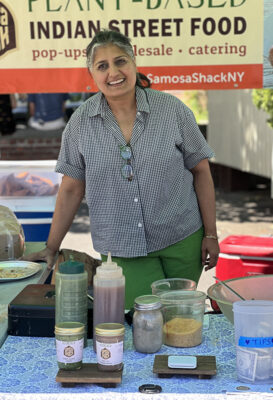
Local bakers and restauranteurs are excited about the prospect of a greater selection of regional grains.
Eight years ago, Mini Dhingra started Samosa Shack, a food catering (a plant-based food company with weekly meal service, catering, and farmers’ markets) service in Westchester County. In 2019 she joined the Kingston Farmers Market and in March 2022 relocated the business to Kingston. This past spring, she came upon Milestone Mill products at the farmer’s market and began using the flour for samosas, mini-puris, and other Indian flatbreads.
“I like that it’s almost got a rougher, coarser (feel to it) and that’s not traditional but I love the taste of it,” she says.
Dhingra said she had a hard time finding local wheat and flour, which are a staple of samosas.
“I am a big fan of local — we buy probably 80 percent of our produce from local farmers,” says Dhingra who previously purchased small bags of flour through wholesale but it was challenging. “I couldn’t find that volume locally grown and milled,” she says.
Growing local, hiring local, buying local, and baking local is important to her.
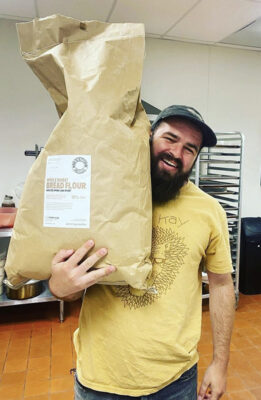
“I always feel that local is better there’s shorter travel time and it is a local food system that is working together,” she says. “To me, it’s just more sustainable.”
To be sure, consumers say they feel more connected when they buy locally.
Heather Kamin, co-owner of Cotton Hill Creamery, picked up a bag of Milestone Mill corn meal at Kingston Farmers Market for a planned raspberry cornmeal cake.
Kamin says: “I am always excited to be able to shop locally and New York State grains are a very special and new thing. I mostly haven’t been searching for it, I am just very glad of the serendipity of coming across it.”
-Amy Wu
To learn more about Milestone Mill click here or visit Milestone Mill
Click here to watch “Growing with The Grain”
To read more about the Field Crops Field Day click here.
